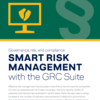What are the challenges currently facing companies?
The sheer number of laws, regulations and ethical standards that companies are required to meet has risen almost exponentially in the last four to five years. This upward trend is expected to continue. Excel spreadsheets and manual processes have long since been insufficient as ways for companies to combine legal compliance with cost efficiency. This is where digital processes and solutions come in.
Many companies lack not only transparency into their data and processes but also a comprehensive IT strategy covering governance, risk, and compliance, which is essential for a structured approach to these varied topics.
What can companies do to ensure they are legally compliant?
The best approach is to drive forward the comprehensive digitalization of their GRC-related activities. The first step should be developing a specific IT strategy for this area. In many cases, this is a major change management and organizational development project – and, at LHIND, we can support managers through this.
That said, companies don’t necessarily need to do absolutely everything at once. Our GRC Suite, for example, offers various solutions that we can quickly and efficiently tailor to companies of all sizes. These solutions cover the most important GRC areas, from legally compliant deployment of external workforce and service providers to building protection, information security and business continuity management.
Special legal tech solutions like these make companies’ data and processes transparent. This way, enterprises can identify risks, remedy their legal shortcomings, fulfill their reporting obligations and make their processes more efficient. Not only does this create legal certainty, it also provides considerable added value for the company, including by cutting costs.
What can we expect from the GRC field in the future?
I regard the 2020s as the decade of legal tech: I expect to see major advances in the digitalization and transformation of legal processes. Artificial intelligence and its manifold applications will play a decisive role in this.
At LHIND, we’re constantly developing our solutions and plan to integrate AI functionalities into the GRC Suite – from company-specific AI chatbots to sophisticated analyses to AI-assisted, cost-optimized verification and approval processes.
For companies that have not yet implemented digital solutions in their GRC activities, it’s high time to get started. Ultimately, this isn’t just a question of legal certainty, it’s about companies’ fundamental ability to compete in the future.


